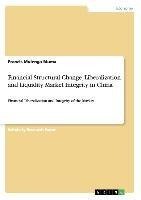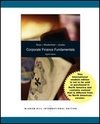
-
 Anglický jazyk
Anglický jazyk
Financial Structural Change, Liberalization and Liquidity Market Integrity in China
Autor: Francis Mulenga Muma
Research paper from the year 2011 in the subject Economics - Monetary theory and policy, grade: A, Xiamen University (School of Economics), course: Economics, language: English, abstract: Money market refers to an exchange for buying and selling of financial... Viac o knihe
Na objednávku, dodanie 2-4 týždne
18.54 €
bežná cena: 20.60 €
O knihe
Research paper from the year 2011 in the subject Economics - Monetary theory and policy, grade: A, Xiamen University (School of Economics), course: Economics, language: English, abstract: Money market refers to an exchange for buying and selling of financial and money market instruments where financial institutions make transactions of short-term financial instruments for short-term financing and liquidity management. China's money market is mainly made up of interbank funding market and bond repurchase agreement market commonly referred to as repo market.Since the market-oriented economic reform in 1978, China has entered into a stage of financial deregulation and liberalization. With the growth of the national economy and change of national income structure, China's finance has increased rapidly, which has brought a great deal of changes in the financial structure. In 1978, broad money (M2) balance was near RMB150 billion yuan. By the end of 2001, M2 balance was up to RMB16,000 billion yuan, an increase of over 100 times in the past twenty years, implying a growth rate of 5 percent a year in 20 years. However, with this financial development and deepening, China needs to liberalize the financial market further and let the liquidity conditions reflect the market realities and integrity.
Some scholars argue that China's financial liberalization remains incomplete as the behavior of short-term market-determined interest rates is influenced by regulated rates. This paper argues that to have integrity of the market China should further liberalize its retail interest rates to allow all interest rates to better reflect liquidity conditions and the scarcity of capital.
China has taken important steps to liberalize its interest rates. Short-term interbank interest rates were liberalized initially, financial and treasury bond yields were liberalized soon after, followed later by the liberalization of the corporate fixed
- Vydavateľstvo: GRIN Verlag
- Rok vydania: 2012
- Formát: Paperback
- Rozmer: 210 x 148 mm
- Jazyk: Anglický jazyk
- ISBN: 9783656250005












